The themes of sustainability, enterprise and employability and internalization are central to the programme. The Programme has been structured so that the final target award of graduate certificate and graduate diploma in project management and also designation qualification in project management.
The Course seeks to develop the skills of post graduate managers and engineers in the following areas.

- A critical awareness of contemporary issues in project management informed by leading edge research and practice and the capacity to apply emerging principles and project management skills to standard and unpredictable workplace scenarios.
- A detailed understanding of project management knowledge areas and control methods which can be applied within the project management and engineering process.
- The capacity to undertake and reflect upon strategic and complex decision making in the project management process.
- Leadership and teams skills, personal and interpersonal skills which can be applied to the project management process.
- Relevant skills in order to pursue lifelong learning and continuous development in the context of workplace practice within the subject specialism and international project management.
- The ability to identify, retrieve and assess the rigour and value of published research as the source of alternative perspective that inform and underpin the project management decision making process and investigate research.
- Creative and innovative approaches to investigate research including the review, evaluation and selection with justification of appropriate research methodologies and the communication of findings in an objective, coherent and professional manner.
- Develop the student’s research methods and applications.
Program Aims
The aims of the programme are to establish and develop.
- A critical awareness of contemporary issues in project management informed by leading edge research and practice and the capacity to apply emerging principles and project management skills to standards and unpredictable workplace scenarios.
- A detailed understanding of project management knowledge areas and control methods which can be applied within the project management and engineering processes.
- Effective use of innovative tools, techniques and methodologies as applied to project management and the research process.
- The capacity to undertake and reflect upon strategic and complex decision –making in the project management process.
- Leadership and team skills, personal and interpersonal skills which can be applied to the project management process.
- Relevant skills in order to pursue life-long learning and continuous development in the context of workplace practice, within the subject specialism and international project management.
- The ability to identify, retrieve and assess the rigour and value of published research as the source of alternative perspectives that inform and underpin the project management decision making process and investigate research.
- Creative and innovative approaches to investigate research including the review evaluation and selection with justification of appropriate research methodologies and the communication of findings in an objective, coherent and professional manner.
Develop the student’s research methods and application.
Awards Graduate Qualification
- Graduate Certificate in Project Management
- Graduate Diploma in Project Management
Awards Designation Qualification
- Certified Project Professional (CPP)
- Certified Project Manager (CPM)
- Certified Project Director (CPD)
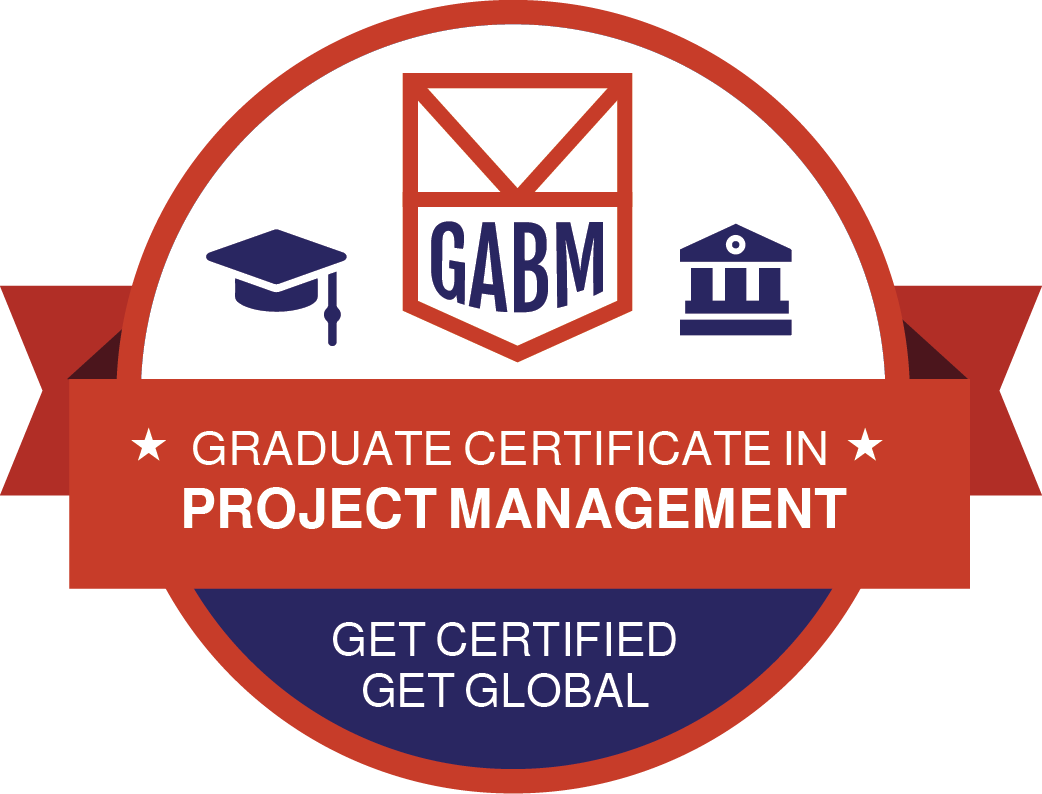
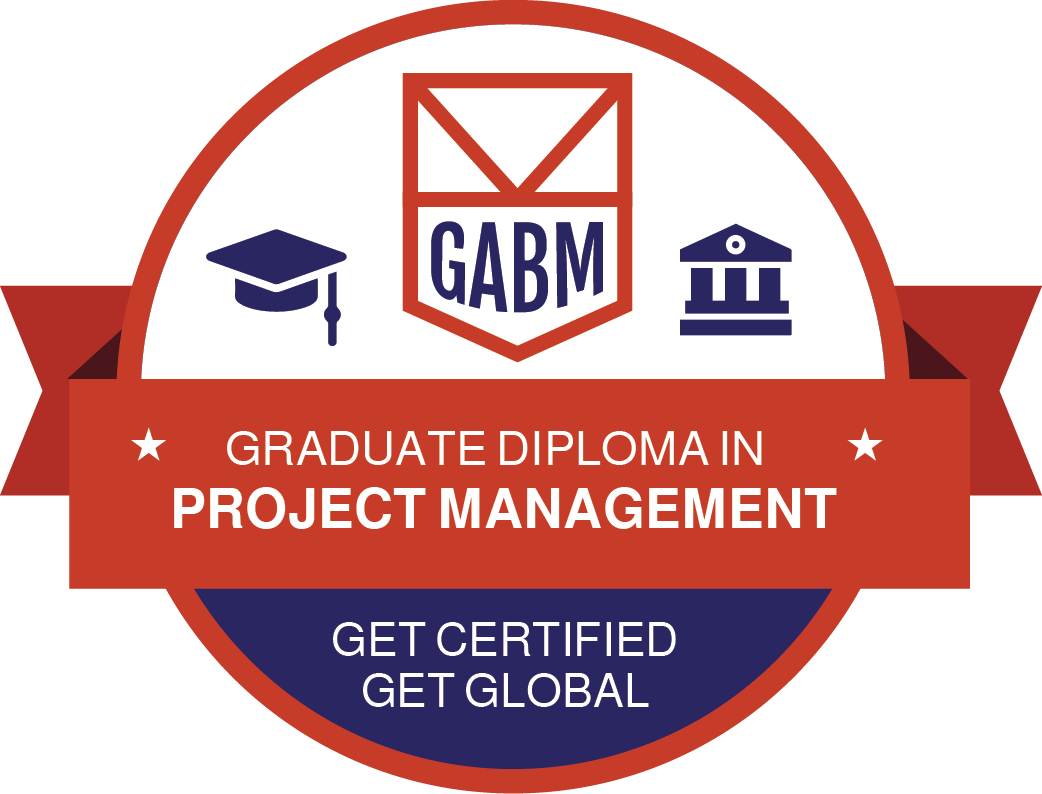
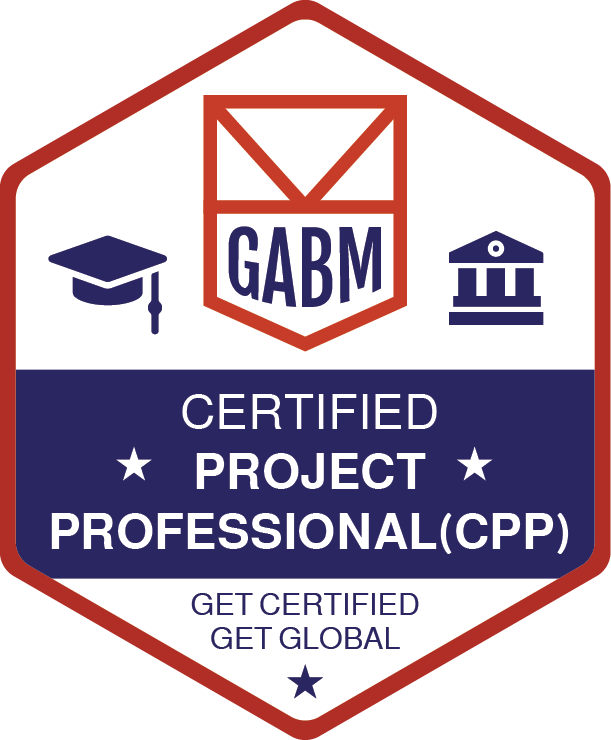
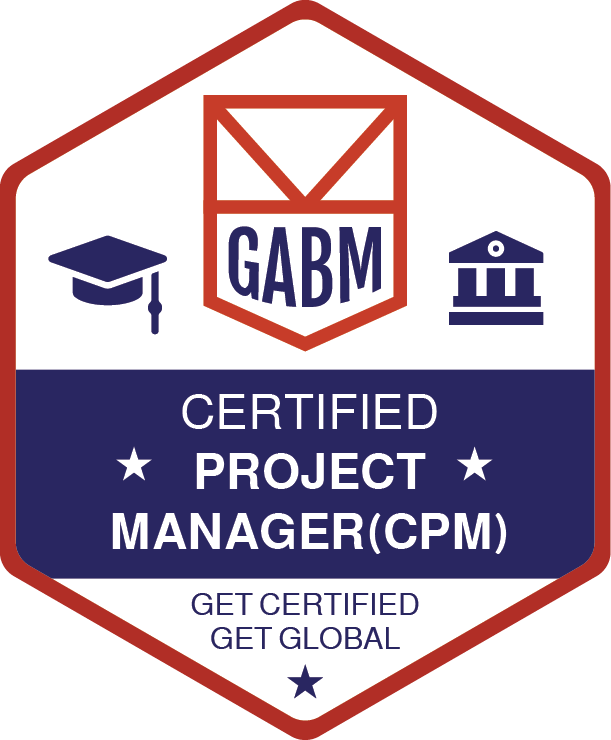
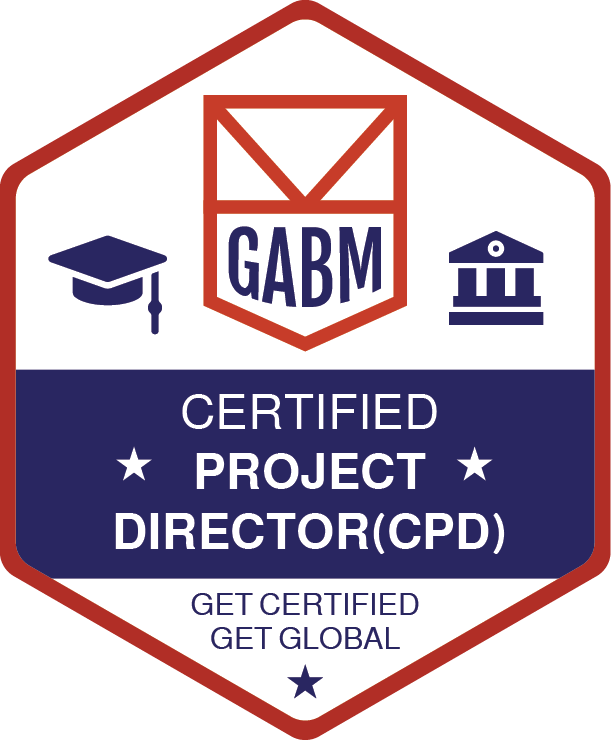
Awards are conferred in accordance with the GABM General and Academic Regulations for Students and the GABM Postgraduate Programme Assessment, Progression and Award Regulations.
Graduate Certificate in
Project Management
Indian Rupees
Indian Nationals
14,999/-
US Dollars
International
Students
250$
Complete Learning Pack
4-6 Months Access
Graduate Diploma in
Project Management
Indian Rupees
Indian Nationals
18,999/-
US Dollars
International
Students
300$
Complete Learning Pack
4-6 Months Access
Certified Professional in
Project Management
Indian Rupees
Indian Nationals
18,999/-
US Dollars
International
Students
300$
Complete Learning Pack
4-6 Months Access
Certified Manager in
Project Management
Indian Rupees
Indian Nationals
24,999/-
US Dollars
International
Students
350$
Complete Learning Pack
4-6 Months Access
Certified Director in
Project Management
Indian Rupees
Indian Nationals
29,999/-
US Dollars
International
Students
400$
Complete Learning Pack
4-6 Months Access
Entry Requirements
Entrants to this programme are normally required to have attained the following.
- Applicants should either have at least Secondary school or entry to bachelor degree for
Graduate certificate - Students who have completed bachelor degree / fresher or final year students can apply for
Graduate diploma. - Students who have completed bachelor degree / fresher or final year students can apply for
professional certificate. - Bachelor degree with 2 years’ experience for Managerial certificate.
- Bachelor degree with 2 years’ experience for Managerial certificate.
- Bachelor degree with 5 years’ experience for Director Certificate.
- A good honors degree or equivalent in a relevant subject or and work experience in relevant
management or other related field.
Career Prospect
This programme equips students with the essential subject knowledge and postgraduate skills and expertise to enable them to enter and work within the Project and Project Management areas of practice within the project management industry.
Who Should Attend
- Project managers/team leaders
- Team leaders moving into team leadership positions
- Key team members
- Functional managers
- Process and performance improvement team members
- Business planning personnel
- Anyone who would like to advance their career through project management certification.
Learning and Training Methods
The project management programme uses a number of different assessment techniques that will allow you to demonstrate your understanding of concepts and issues covered. These may be broadly categorized as ‘coursework’ which may be in the form of individual or group assignments, practical problem-solving exercises and presentations.
It should be emphasized that the purpose of assessment is not only grade you, and provide information to facilitate management of the course, but also to provide feedback to you. In this manage it accordingly. You should keep all the returned assessment work in a file as you may have to submit this at the end of the programme for the academy to assess.
Individual model leaders will distribute information on the methods of assessment used, and their weighing at the start of each module.
Programme Curriculam MAP
|
Module / Description |
Graduate Certificate |
Graduate Diploma |
Certified Financial Professional |
Certified Financial Manager |
Certified Financial Director |
|---|---|---|---|---|---|
| Introduction to project management | |||||
| Evolution of project management | |||||
| Project Management Model | |||||
| Industry Trends in project management | |||||
| Project Organization Concepts | |||||
| Project Life Cycle Management | |||||
| Project Initiation | |||||
| Project Plan Development | |||||
| Scope Management | |||||
| Schedule Management | |||||
| Cost Management | |||||
| Quality Management | |||||
| Project Communication Management | |||||
| Project Stakeholder Management | |||||
| Procurement Management | |||||
| Risk Management | |||||
| Project Execution and Control | |||||
| Change Management | |||||
| The Closing Procedures | |||||
| Assignments | |||||
| Project Report – 100 Points | |||||
| Credit Points |
240 |
280 |
400 |
480 |
480 |
Modules
- Introduction
- Project management
- Role of project management
- Project manager skills
- Success management
- Text context and organization
- Text Structure
Unit 2-Evolution of project management
- Introduction
- Early history of project management
- Application of analytical science
- Frederick Taylor and scientific management
- Frank and Lillian gilbreth
- Henry Gantt
- Mary parker Follett
- Elton Mayo
- Phases of project management evolution
- Project management challenges
- Project management benefits
- Introduction
- Evolution of PMI model
- Ancillary standards and certifications
- Structure of PMBOK guide model
- Knowledge areas
- Overall process view
Unit 2-Industry trends in project management
- Standardizing project management
- Enterprise project management
- EPM in operation
- Implementation and advantages of EPM
- Others trends impacting project management
- Project management perspective.
- PM role
- Reporting relationships
- Team resources
- Team productivity and size
- Teams physical location issues
- Team dynamics
- Virtual organizations
- Organizational culture
Unit 2-Project life cycle management
- Life cycle models
- Overview of project methodologies
- Methodology and vocabulary
- Key project management artifacts
- Introduction
- Expanding the project vision
- Project initiation
- Project origins
- Business case – documentation of the vision
- Organizational review
- Management review
- Formal charter signed
- Preliminary scope statement
Unit 2-Project plan development
- Planning philosophy arguments
- Conflicting expectations
- Overlooking the real solution
- Competing solutions
- Misaligned goals
- Quality solutions
- Project monitoring and control
- Plan process and components
- Plan artifacts
- Conclusion
- Introduction
- Defining project work units
- WP planning variables
- Multiple WPS
- Developing the total project view
- Developing project WBS
- WBS dictionary
- WBS mechanics
- WBS numbering scheme
- Other WBS views
- Tracking status of the project
- WBS construction checklist
- Requirements “ibilities”
- Moving forward
- Introduction
- Defining project activities
- Activity sequencing
- Estimating activity resources
- Activity duration estimating
- Tips for accurate estimating
- Types of estimates
- Estimating techniques
- Activity sequencing
- Time calculation
- Estimating checklist
- Network mechanics
- Establishing the project activity sequencing
- Forward pass calculation
- Backward pass calculation
- Defining critical path
- Manipulating activity results
- Formatting activity results g
- Which diagram format wins?
- Introduction
- Project cost planning basics
- Cost planning
- Cost accuracy
- Organizational overhead
- Scope, time and cost alignment
- Indirect costs
- Resource alignment
- Budget reserves
- Resources have different colors
- Management approval and baselines
- Introduction
- Evolution of quality
- Definition of quality
- Project quality management
- Quality perspective
- Implications of project planning
- Quality planning
- Quality management components
- Quality definition
- Implementing a quality plan
- Quality assurance
- Quality control
- QA vs. QC operational roles
- Quality gurus
- Quality management programs
- Evaluating quality
- Benchmarking
- Continuous improvement
- Failure mode and effect analysis
- Quality tools
- Other quality analysis techniques
- Organizational roles and responsibilities
- Implementation issues in quality management
- Future of quality management
- Quality worksheet experience
- Introduction
- Engaging employees : a case study
- Communication management process
- Plan communication
- Distribute information
- Report performance
- Human communications model
- Communication channels
- Communicating information
- Improving the effectiveness of communication
- Effective listening
- Barriers to effective communication
- Communication tension
- Communication styles
- Communication : The impossible goal
- Introduction
- Identifying stakeholders
- Stakeholder classification
- Managing stakeholder engagement
- Adoption and organizational change management
- Introduction
- Procurement management
- Make or buy decisions
- Procurement management process
- Planning for procurement
- Conduct procurements
- Bidding processes
- Selecting sellers
- Contract negotiation
- Contracts
- Administer procurements
- Procurement audits
- Contract review and reporting
- Close procurements
- Introduction
- Risk terms
- Risk management planning
- Risk identification
- Qualitative and quantitative risk analysis
- Risk assessment
- Risk response planning
- Risk contingency budget
- Risk monitoring and control
- Introduction
- Magic twelve success indicators
- The human interface
- Managing the projects
- Human relations and communication issues
- Introduction
- Integrated change control
- Change control system
- Configuration management
- Change management workflow
- External communications issues
- Change request checklist
- Project implementation review
- Normal project termination
- Abnormal termination
- Termination model
- Project termination checklist
- Project team and client relationship
- Creating lessons learned documentation
- Lessons learned report
- Project team celebration
Program Structure
| Module Code | Module | Core/Elective | Credit Points |
|---|---|---|---|
| PM-101 | Introduction to project management | Core | 20 |
| PM-102 | Evolution of project management | Elective | 20 |
| PM-103 | Project Management Model | Core | 20 |
| PM-104 | Industry Trends in project management | Elective | 20 |
| PM-105 | Project Organization Concepts | Core | 20 |
| PM-106 | Project Life Cycle Management | Elective | 20 |
| PM-107 | Project Initiation | Core | 20 |
| PM-108 | Project Plan Development | Core | 20 |
| PM-109 | Scope Management | Core | 20 |
| PM-110 | Schedule Management | Core | 20 |
| PM-111 | Cost Management | Core | 20 |
| PM-112 | Quality Management | Core | 20 |
| PM-113 | Project Communication Management | Core | 20 |
| PM-114 | Project Stakeholder Management | Elective | 20 |
| PM-115 | Procurement Management | Elective | 20 |
| PM-116 | Risk Management | Elective | 20 |
| PM-117 | Project Execution and Control | Core | 20 |
| PM-118 | Change Management | Elective | 20 |
| PM-119 | The Closing Procedures | Core | 20 |
| Distinctive features of the Programme | |||
|
|||
Assessment Pattern
The GABM global academy consists of variety of assessment modes.
- Assessed assignments ( in essay , report, problem, case studies or short question format)
- Written examination papers.
- Project report submission.
The exact combination of assessment varies from programme to programme and from module to module.
| Programme | Assessment pattern | Credit Points |
|---|---|---|
| Graduate certificate in Project Management |
1 Assignment | 240 |
| Graduate Diploma in Project Management |
2 Assignment | 280 |
| Certified Project Professional(CPP) |
3 Assignment | 400 |
| Certified Project Manager(CPM) |
3 Assignments with project report | 480 |
| Certified Project Director(CPD) |
3 Assignments with project report | 480 |
Note: Assignments and patterns are subject to change without notice; candidates are required to contact office of executive education and professional certification of the academy for respective programme before start of the course.

